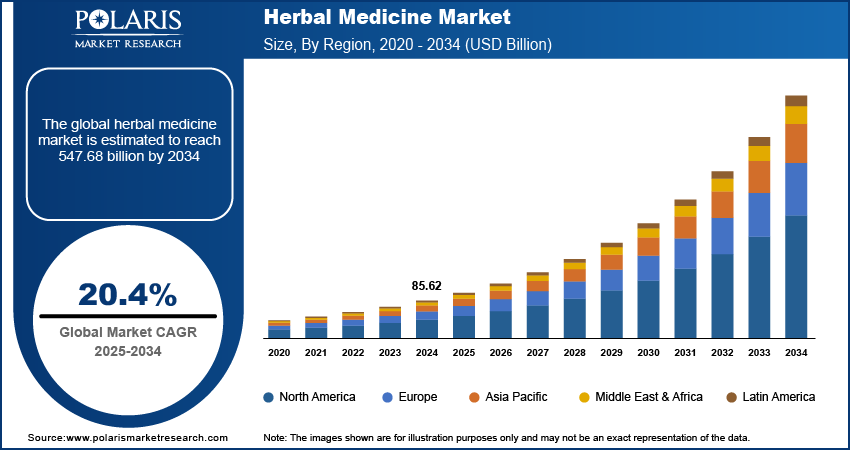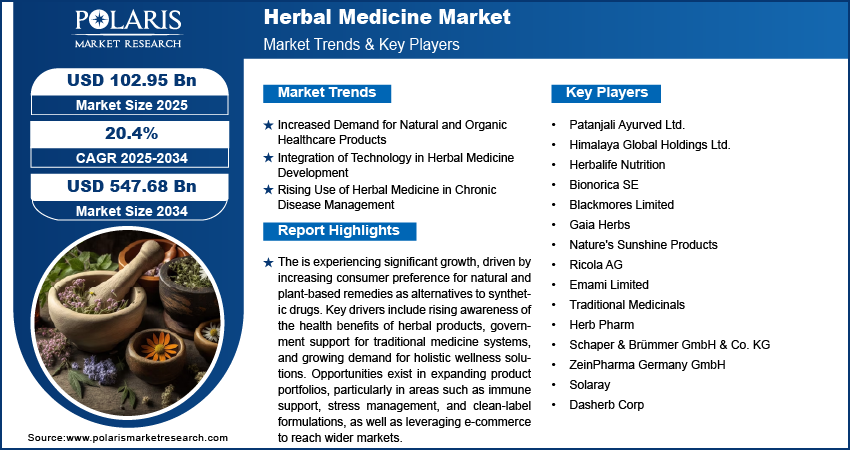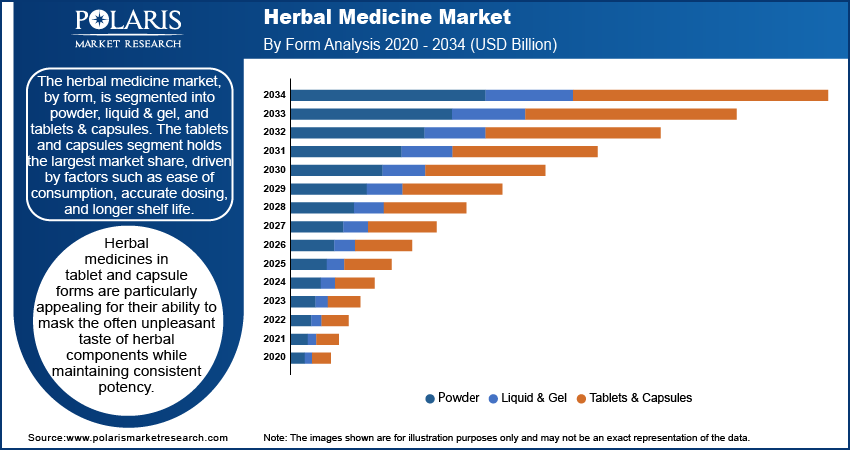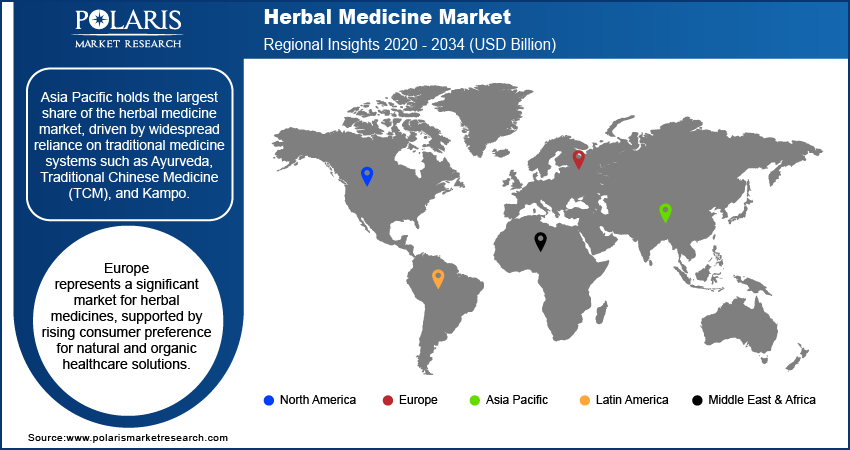
Herbal Medicine Market Size, Share, Trends, Industry Analysis Report: By Category, Form, Source, Distribution Channel (E-commerce and Hospitals & Retail Pharmacies), Application, Intervention, and Region (North America, Europe, Asia Pacific, Latin America, and the Middle East & Africa) – Market Forecast, 2025–2034
- Published Date:Dec-2024
- Pages: 120
- Format: PDF
- Report ID: PM1671
- Base Year: 2024
- Historical Data: 2020-2023
Herbal Medicine Market Overview
The herbal medicine market size was valued at USD 85.62 billion in 2024. The market is projected to grow from USD 102.95 billion in 2025 to USD 547.68 billion by 2034, exhibiting a CAGR of 20.4% during 2025 –2034.
The global herbal medicine market encompasses the production, distribution, and sale of plant-based therapeutic products used for the prevention and treatment of various health conditions. The increasing consumer preference for natural and organic healthcare solutions, rising awareness about the potential side effects of synthetic drugs, and growing interest in traditional and alternative medicine systems such as Ayurveda and Traditional Chinese Medicine (TCM) drive the market growth. Trends influencing the market are the expansion of e-commerce platforms, advancements in herbal product formulations, and rising investments in research and development for clinical validation of herbal remedies. Regulatory support and initiatives promoting sustainable farming practices further contribute to the herbal medicine market development.

To Understand More About this Research: Request a Free Sample Report
Herbal Medicine Market Dynamics
Increased Demand for Natural and Organic Healthcare Products
Consumers are increasingly turning toward natural and plant-based healthcare options, owing to the rising concerns related to the side effects of synthetic drugs. The growing preference for sustainable and organic solutions has positioned herbal medicine as a popular choice for wellness and chronic disease management. According to the World Health Organization (WHO), herbal medicine constitutes the primary healthcare method for 80% of the population in some Asian countries, highlighting its global prominence. Investments in research and development by governments, such as India's AYUSH initiatives, further support the herbal medicine market expansion.
Integration of Technology in Herbal Medicine
The herbal medicine industry is leveraging technological advancements for enhanced research, production, and marketing. Initiatives by market players, such as Himalaya Global Holdings' state-of-the-art research center, focus on developing high-quality herbal pharmaceuticals and personal care products. Additionally, digital platforms and e-commerce have become vital for manufacturers to reach a broader audience, enhancing consumer accessibility and engagement with herbal products. Thus, the integration of advanced technology in herbal medicine would propel the herbal medicine market growth in the coming years.
Rising Use of Herbal Medicine in Chronic Disease Management
The rising use of herbal medicine in chronic disease management reflects a growing preference for natural, holistic approaches to healthcare. Herbal remedies, derived from plant-based sources, offer therapeutic benefits for conditions such as diabetes, arthritis, and cardiovascular diseases. Their appeal lies in fewer side effects, affordability, and alignment with wellness trends. Additionally, scientific advancements have enhanced the efficacy and standardization of herbal formulations, boosting consumer trust. Studies on medicinal plants are receiving greater funding, especially in regions, including the U S and Asia Pacific, where governments support herbal medicine development. For example, the WHO’s Global Center for Conventional Medicine in India aims to promote the use of herbal solutions for chronic conditions worldwide.

Herbal Medicine Market Segment Insights
Herbal Medicine Market Outlook – Form-Based Insights
The herbal medicine market, by form, is segmented into powder, liquid & gel, and tablets & capsules. The tablets and capsules segment holds the largest market share, driven by factors such as ease of consumption, accurate dosing, and longer shelf life. These forms are particularly appealing for their ability to mask the often unpleasant taste of herbal components while maintaining consistent potency. Advances in pharmaceutical technology, such as sustained-release formulations and microencapsulation, have enhanced the bioavailability of active herbal ingredients in tablets and capsules, further fueling their popularity among consumers. Additionally, these forms are favored for their widespread regulatory approval, simplifying market entry for manufacturers and broadening their adoption for diverse health applications, including dietary supplements and chronic condition management.
The liquid and gel segment is also gaining traction, primarily due to their faster absorption rates and suitability for specific applications such as skincare and therapeutic use. The powder segment, while less dominant, holds steady appeal among consumers seeking customizable and versatile herbal remedies. This form is often used in traditional practices or for blending into food and beverages. However, the tablets and capsules segment remains the preferred choice across various demographic groups due to their convenience and well-established reputation for reliability in delivering health benefits. This trend is propelled by strong investments in consumer education and innovative product development by key industry players.
Herbal Medicine Market Assessment – Application-Based Insights
The herbal medicine market, by application, is segmented into pharmaceutical & nutraceuticals, food & beverages, and personal care & beauty products. The pharmaceutical & nutraceutical segment holds the largest share of the herbal medicine market revenue, driven by increasing consumer preference for natural and plant-based treatments to manage health conditions and enhance overall wellness. The segment benefits from the growing trust in herbal remedies as safer alternatives to synthetic drugs, especially for chronic illnesses and preventive healthcare. Regulatory support and investments in research to validate the efficacy of herbal ingredients have further solidified this segment's position in the market. Manufacturers have focused on developing innovative formulations, such as encapsulated herbal extracts and bio-enhanced nutraceuticals, ensuring higher bioavailability and consumer satisfaction.
The personal care & beauty products segment is registering the highest growth due to rising consumer interest in clean beauty and natural skincare products. Ingredients such as turmeric, aloe vera, and neem are increasingly utilized in products addressing anti-aging, hydration, and skin rejuvenation needs. This trend aligns with the broader movement toward sustainable and eco-friendly products. Additionally, food and beverage applications are expanding as herbal teas, functional beverages, and adapt genic blends gain popularity for their health benefits, such as stress relief and immune support.
Herbal Medicine Market Evaluation – Distribution Channel Insights
The herbal medicine market, by distribution channel, is segmented into hospital & retail, pharmacies, and e-commerce. The hospital and retail pharmacies segment dominates the market, attributed to their role as primary access points for patients seeking professional healthcare guidance. These channels benefit from rising adoption rates of herbal medicines in clinical treatments, driven by their reduced side effects and growing acceptance among healthcare providers. Additionally, improved availability of herbal products in hospital pharmacies supports the segment's sustained market leadership.
However, e-commerce platforms are emerging as the fastest-growing distribution channel. The convenience of online purchasing, coupled with expanding internet accessibility in urban and rural areas, drives this growth. The increasing preference for direct-to-consumer sales through e-commerce aligns with the demand for transparency and wider product availability. Furthermore, online platforms facilitate the sale of niche or lesser-known herbal products, which may not be readily available in physical pharmacies, supporting their rising market significance.

Herbal Medicine Market Regional Insights
By region, the study provides herbal medicine market insights into North America, Europe, Asia Pacific, Latin America, and the Middle East & Africa. Asia Pacific holds the largest share of the market revenue, driven by widespread reliance on traditional medicine systems such as Ayurveda, Traditional Chinese Medicine (TCM), and Kampo. This dominance is supported by strong governmental initiatives, including the establishment of WHO's Global Center for Traditional Medicine in India, and increasing consumer preference for natural and plant-based treatments. Countries such as China and India lead the regional market due to their rich history of herbal medicine use, extensive biodiversity, and expanding research and development efforts. The region's rapidly growing middle-class population and rising disposable incomes further drive demand, while exports of herbal products from these countries boost the global market.
Europe represents a significant market for herbal medicines, supported by rising consumer preference for natural and organic healthcare solutions. Germany is a key player with a long history of integrating herbal medicine into conventional healthcare. The region benefits from stringent regulatory frameworks that ensure product safety and efficacy, enhancing consumer trust. The growing popularity of herbal cosmetics and dietary supplements also boosts the herbal medicine market demand, particularly in countries such as the UK and France. Additionally, increasing awareness about sustainable and eco-friendly products aligns with the herbal medicine market's values, further driving growth.

Herbal Medicine Market – Key Players and Competitive Insights
The global herbal medicine market includes several key players actively contributing to the industry's growth through innovative strategies and extensive product portfolios. Prominent companies in this market are Herbalife Nutrition, Bionorica SE, Patanjali Ayurved Ltd., Himalaya Global Holdings Ltd., Blackmores Limited, ZeinPharma Germany GmbH, Nature's Sunshine Products, Gaia Herbs, Emami Limited, Ricola AG, Traditional Medicinals, Herb Pharm, Schaper & Brümmer GmbH & Co. KG, Solaray, and Dasherb Corp. Many of these players focus on expanding their geographic footprint, launching new product lines, and establishing partnerships to strengthen market presence.
Competitive dynamics in this market reveal diverse approaches, such as leveraging advanced research in natural ingredient formulations and integrating traditional knowledge with modern technology. For example, companies such as Herb Pharm and Traditional Medicinals emphasize sustainability and purity in sourcing ingredients. Meanwhile, firms such as Bionorica SE invest significantly in clinical trials to validate herbal products' efficacy, giving them a scientific edge. The market also sees regional players such as Patanjali Ayurved Ltd. capitalizing on local demand for ayurvedic products while diversifying into global markets.
As competition intensifies, companies focus on adapting to regulatory frameworks, particularly in regions such as North America and Europe. Strategic collaborations, such as those undertaken by Blackmores Limited, help penetrate untapped markets while maintaining compliance. The focus on natural and organic certifications, as well as clean labeling, remains central to product differentiation and consumer trust. These factors collectively shape a highly dynamic competitive environment.
Patanjali Ayurved, based in India, is a significant player in the herbal medicine market. The company emphasizes ayurvedic remedies and wellness products. It offers a broad range of herbal products, including dietary supplements, medicines, and personal care items, catering to domestic and international markets.
Himalaya Global Holdings Ltd., headquartered in India, specializes in health and personal care products derived from herbal formulations. Its portfolio includes pharmaceuticals, supplements, and skincare products rooted in ayurvedic traditions.
List of Key Companies in Herbal Medicine Market
- Patanjali Ayurved Ltd.
- Himalaya Global Holdings Ltd.
- Herbalife Nutrition
- Bionorica SE
- Blackmores Limited
- Gaia Herbs
- Nature's Sunshine Products
- Ricola AG
- Emami Limited
- Traditional Medicinals
- Herb Pharm
- Schaper & Brümmer GmbH & Co. KG
- ZeinPharma Germany GmbH
- Solaray
- Dasherb Corp
Herbal Medicine Industry Developments
- In October 2023, Patanjali announced its plans to launch a new line of herbal nutraceutical products, aiming to integrate modern nutrition with traditional ayurvedic principles. This expansion aligns with the company's goal to increase its presence in global wellness markets
- In September 2023, Himalaya introduced an innovative herbal cough syrup with clinical evidence supporting its efficacy. This launch was part of the company’s efforts to address respiratory health concerns while maintaining its commitment to sustainable sourcing and eco-friendly practices.
Herbal Medicine Market Segmentation
By Form Outlook
- Powder
- Liquid & Gel
- Tablets & Capsules
By Application Outlook
- Pharmaceutical & Nutraceutical
- Food & Beverages
- Personal Care & Beauty Products
By Distribution Channel Outlook
- Hospital & Retail
- Pharmacies
- E-Commerce
By Regional Outlook
- North America
- US
- Canada
- Europe
- Germany
- France
- UK
- Italy
- Spain
- Netherlands
- Russia
- Rest of Europe
- Asia Pacific
- China
- Japan
- India
- Malaysia
- South Korea
- Indonesia
- Australia
- Vietnam
- Rest of Asia Pacific
- Middle East & Africa
- Saudi Arabia
- UAE
- Israel
- South Africa
- Rest of Middle East & Africa
- Latin America
- Mexico
- Brazil
- Argentina
- Rest of Latin America
Herbal Medicine Market Report Scope
|
Report Attributes |
Details |
|
Market Size Value in 2024 |
USD 85.62 billion |
|
Market Size Value in 2025 |
USD 102.95 billion |
|
Revenue Forecast by 2034 |
USD 547.68 billion |
|
CAGR |
20.4% from 2025 to 2034 |
|
Base Year |
2024 |
|
Historical Data |
2020–2023 |
|
Forecast Period |
2025–2034 |
|
Quantitative Units |
Revenue in USD billion and CAGR from 2025 to 2034 |
|
Report Coverage |
Revenue Forecast, Market Competitive Landscape, Growth Factors, and Trends |
|
Segments Covered |
|
|
Regional Scope |
|
|
Competitive Landscape |
|
|
Report Format |
|
|
Customization |
Report customization as per your requirements with respect to countries, regions, and segmentation. |
FAQ's
The global market size was valued at USD 85.62 billion in 2024 and is projected to grow to USD 547.68 billion by 2034.
The global market is projected to register a CAGR of 20.4% during 2025 –2034.
Asia Pacific accounted for the largest share of the global market in 2024.
Prominent companies in this market are Herbalife Nutrition, Bionorica SE, Patanjali Ayurved Ltd., Himalaya Global Holdings Ltd., Blackmores Limited, ZeinPharma Germany GmbH, Nature's Sunshine Products, Gaia Herbs, Emami Limited, Ricola AG, Traditional Medicinals, Herb Pharm, Schaper & Brümmer GmbH & Co. KG, Solaray, and Dasherb Corp.
The tablets & capsules segment led the herbal medicine market share in 2024.
The pharmaceutical & nutraceutical segment accounted for the largest share of the global market in 2024.
Herbal medicine refers to the use of plant-based substances and extracts to treat or prevent various health conditions. It is a key component of traditional medicine systems such as Ayurveda, Traditional Chinese Medicine (TCM), and indigenous healing practices across the world. Herbal medicines can be used in various forms, including teas, capsules, powders, oils, and tinctures. These remedies contain bioactive compounds that interact with the body to support health, enhance immunity, and manage symptoms of chronic diseases. The global shift toward natural and holistic healthcare, along with increasing consumer preference for sustainable and organic products, has contributed to the herbal medicine market growth.
A few key herbal medicine market trends are described below: ? Increasing Demand for Natural Health Solutions: Consumers are increasingly seeking natural and plant-based alternatives to synthetic pharmaceuticals, driven by concerns over the side effects of conventional drugs and a growing awareness of the benefits of herbal products for wellness and disease prevention. ? Integration of Traditional and Modern Medicine: There's a rising trend toward integrating herbal medicine with conventional healthcare systems. This includes the validation of herbal products through scientific research and clinical trials, helping increase consumer trust and regulatory acceptance. ? Growth of E- Commerce and Online Sales: The rising shift toward online shopping has significantly impacted the distribution of herbal products. E-commerce platforms are allowing companies to reach global markets, enhance consumer access to niche products, and promote health education.
For a new company entering the herbal medicine market, focusing on innovation and sustainability can provide a competitive edge. Developing scientifically validated, high-quality products tailored to specific consumer needs, such as immunity boosters or stress relief, is essential. Investing in eco-friendly practices, including sustainable sourcing of raw materials and biodegradable packaging, can appeal to environmentally conscious customers. Leveraging e-commerce platforms and digital marketing strategies will enhance global reach and brand visibility.
Companies manufacturing, distributing, or purchasing herbal medicine and related products, and other consulting firms must buy the report.
